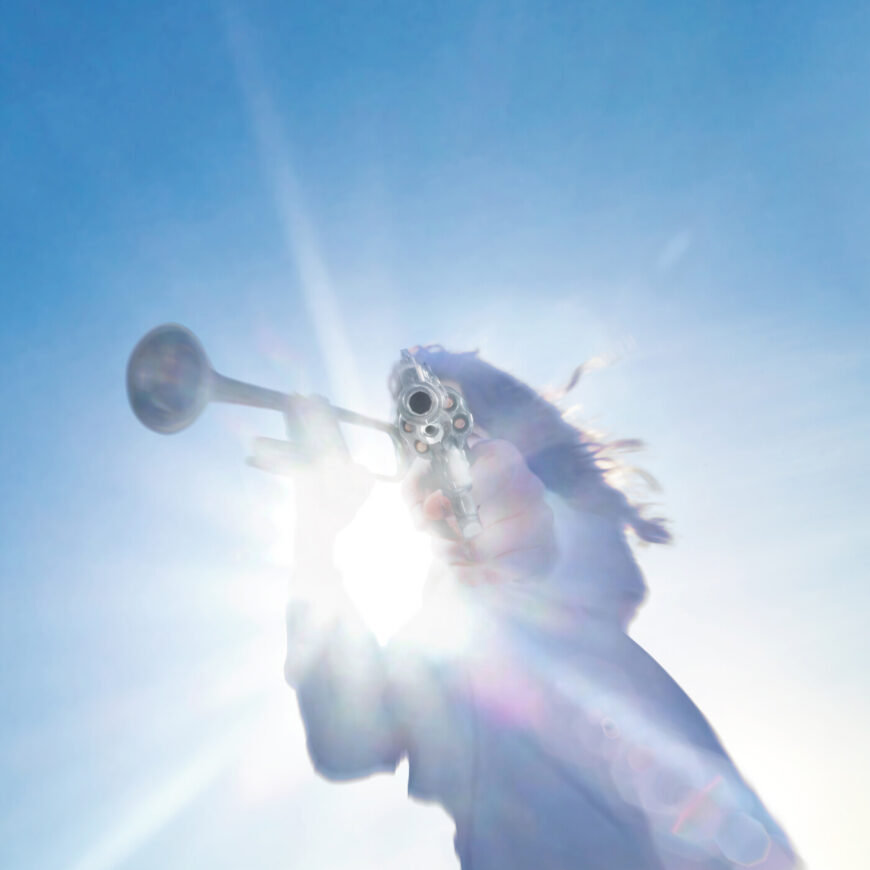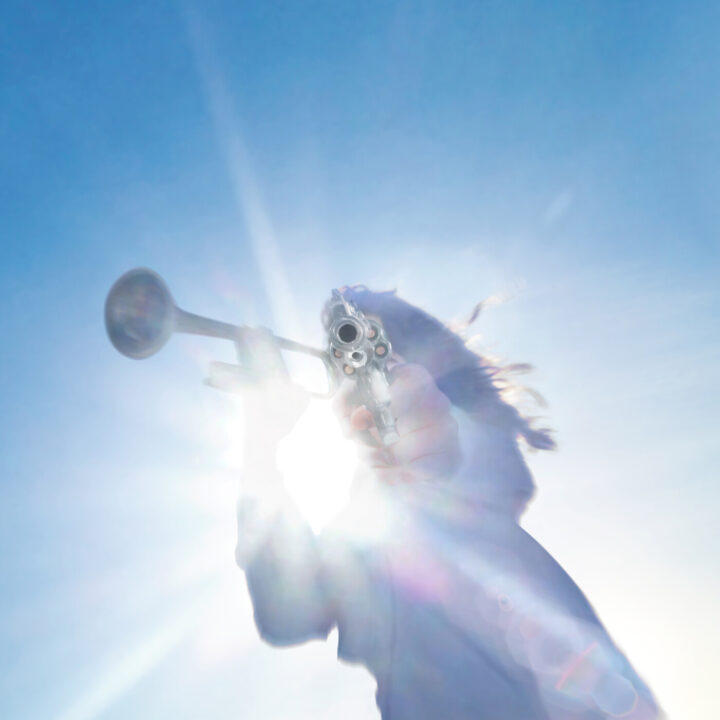“Get in asshole, let’s drive.” Cameron Winter issues the invitation/command about two minutes into Geese’s new album, after he and guest vocalist JPEGMAFIA have already shouted, repeatedly, “THERE’S A BOMB IN MY CAR!” It’s a refrain they’ll return to often on “Trinidad.” The music is as volatile as the subject matter demands, wah-wah guitar and minimal creeping bass giving way to explosive drum fills and bursts of jazz trumpet. By the end, Winter’s uncanny mewling on the verses has given way to something like a street-preacher rant; Geese meet the moment by evoking a funk band that’s gone all-in on noise rock, matching Winter’s screams blow for blow. As the tension ratchets tighter and the manic claustrophobia sets in, you get the sense that the fuse has been lit and it’s only a matter of time.
“Trinidad” is an ideal introduction to a record where danger and uncertainty lurk around every corner, a set of songs that reflect back a tumultuous world at this band’s own off-kilter angles. Geese LP3 is marked by deadly snakes, public executions, and omnipresent war. In elongated moans and bursts of freaked-out fervor, Winter seems to grapple with love and truth, poverty and humiliation, divine retribution and the nature of reality itself. Crucially, it’s often funny too. Titled Getting Killed, it’s an apocalyptic album for apocalyptic times, one that affirms its creators as prospective messiahs for Gen Z rock ‘n’ roll.
Less than a year ago, I would not have expected to be greeting this band with these kinds of hosannas. When Geese emerged mid-pandemic, they were talented New York teens with potential, channeling their childhood indie and classic rock faves into impressive but not earth-shaking psychedelic post-punk. They lost me at first with 2023’s combustible classic rock pivot 3D Country, mostly because I was not prepared for Winter’s new vocal style, a series of over-the-top howls and bellows that put him in league with similarly expressive weirdos like Nick Cave and Jon Spencer. It felt like Geese must be taking the piss, but my perspective shifted around the time Winter returned under his own name, insisting, “I wouldn’t joke about this, I’m not kidding this time!”
Released in December — a dumping ground for unremarkable projects but also a launchpad for stealth-strike masterpieces like Beyoncé and Black Messiah — the singer’s 2024 solo debut Heavy Metal recontextualized that voice for me and legions of other listeners. It was a mesmerizing creative statement, a grand re-arrival through the same door 3D Country had previously kicked in. With his unkempt howls and wilting horn and string arrangements, Winter was still wearing his influences on his sleeve. (Tom Waits, Leonard Cohen, Van Morrison — name your genius poet-crank of choice.) But it wasn’t for lack of his own ideas, conviction, or intangible electricity. With his band’s bravado scaled back in favor of the elegant and abstract, Winter’s honking human-cartoon persona started to feel less like a bit and more like fearless creative expression. He was Father John Misty, liberated from the prison of irony; he was Rufus Wainwright, deconstructed but not defanged; he was Harry Nilsson, winning a staring contest, one piano dirge at a time.
The audacity was part of the appeal: the unflinching refusal to smooth out his music’s rough edges or straighten out its strangest detours, especially after years of indie musicians designing their music to slide into playlists without friction or fuss. “I didn’t make this record thinking about its commerciality,” Winter told Rolling Stone, scoffing at the pushback he’d received from his record label and even some of his close friends. “People want the real shit.” He was onto something there. Not only did Heavy Metal quickly earn a reputation as a cult classic, it inspired Winter’s newfound acolytes to flock to 3D Country — a hell of a rock record once you’ve tuned yourself to Geese’s unhinged wavelength — and amped up anticipation for Getting Killed to a fever pitch.
To the band’s eternal credit, they’ve careened through their window of opportunity with an album that lives up to the hype. Geese recorded Getting Killed in Los Angeles this past January with Kenneth Blume, the genre-hopping DJ and producer formerly known as Kenny Beats, while wildfires were immolating large chunks of Southern California. Blume says the band arrived in LA with material representing a “huge shift in texture, ambiance, and purpose,” and it’s true: The balls-out bluster of 3D Country is contorted into something else entirely here, like some unholy hybrid of Radiohead and the Rolling Stones.
No, seriously: Tell me the title track — on which a saucy chord riff and sampled Ukrainian choir depressurizes into a plaintive, percolating comedown — is not the sound of Sticky Fingers giving way to Amnesiac. On the other hand, tell me it’s not the sound of a band unlocking fresh new alchemy, figuring out how to mold their influences rather than be molded by them. Winter described Geese’s creative process to Blackbird Spyplane like so: “We find something we want to filter through ourselves, and then we sort of have to work backwards to try and un-plagiarize it.” That work is paying off. Although still not exactly hiding their inspirations — including the album art’s apparent Boredoms tribute — Geese have developed their own compelling sonic language. Getting Killed sounds less like a band retrofitting their retro touchpoints and more like the expression of a shared vision that’s becoming clearer and more compelling all the time.
That vision came together through a mix of careful consideration, mad-scientist experimentation, and Geese’s self-imposed pressure to deliver an album all this rampant anticipation demands. Bassist Dominic DiGesu has said many of the album’s songs emerged from 30-minute jams, and you can tell by the fluid way they unspool. Guitarist Emily Green says lessons learned from Heavy Metal hung over the sessions, and you can hear that too: As if inspired by the rich yet minimal palette of Winter’s solo album, the arrangements consistently give his boisterous vocals space to breathe. Rather than stringing together swaggering riffs, the music evolves with the natural sweep of changing weather patterns, locking into grooves and patiently evolving according to the band’s quirky internal logic. Sometimes it’s gentle, sometimes volcanic, but it never ceases to feel like a natural outgrowth of Geese’s hard-won mind meld.
Winter remains at the center of the storm, harnessing that voice more skillfully than ever, using it to weigh in on subjects worthy of the music’s sprawling ambition. On “Husbands,” he dares you not to bother trying to make sense of his lyrics: “I’ll repeat what I say/ But I’ll never explain/ So you don’t have to waste your time.” But sometimes, as on the tumbling-then-soaring lead single “Taxes,” his meaning is clear enough. “I should burn in hell/ But I don’t deserve this/ Nobody deserves this,” he laments, before defiantly asserting, “If you want me to pay my taxes/ You better come over with a crucifix/ You’re gonna have to nail me down.” On the beautiful slow-build “Islands Of Men,” he turns his challenge from God to humanity, seemingly calling on escapists to face down all kinds of perceived threats: “Will you stop running away/ From what is real and what is fake?”
Even when they’re slippery, Winter’s lyrics become verbal Rorschach blots that might inspire deep thought or cause you to laugh out loud: “You may say that our love was only half real/ But that’s only half true,” he argues on the graceful “Half Real,” before belligerently warbling, “You may say that real love is a nail in the wall/ And that’s how a lot of assholes feel/ But that’s not how I feel at all.” Amidst the pounding drums and frenetic strums of “Bow Down,” his character’s grief-stricken sentiments again might just as easily incite a smirk or chin-stroking contemplation: “I was a sailor, and now I’m a boat/ I was a car, and now I’m the road.”
Like Bob Dylan after he left pure protest songs behind, Winter is scripting oblique sequences at an epic scale, blowing out his own anxieties into imagery that conveys the distress of the times. His lyrics may defy interpretation, but the images and sensations he conjures feel like products of a generation defined by upheaval, absurdity, and constant looming threat. For every song in which the biggest problem seems to be too much partying (“I’m getting killed by a pretty good life/ I have been fucking destroyed by the city tonight”), there are several more that feel burdened by the weight of a crumbling world.
Speaking of Dylan, there’s a whiff of “Highway 61 Revisited” in the violently bouncing backbeat of “100 Horses,” one of those barn-burners you can imagine carrying on for half an hour if Geese felt like locking in and rocking out. In a nasal bleat that might remind you of Alt-J or Clap Your Hands Say Yeah, Winter sings of smiling and dancing through wartime, perhaps under compulsion. Amidst the philosophizing, there’s another koan that could double as a punchline: “General Smith told me/ I would never smile again/ He said that I would never smile again/ But not to worry/ For all people must stop smiling once they get what they’ve been begging for.” I don’t know, guys. I think a lot of people are going to be grinning uncontrollably when they finally hear this album.
Getting Killed is out 9/26 via Partisan/Play It Again Sam.








